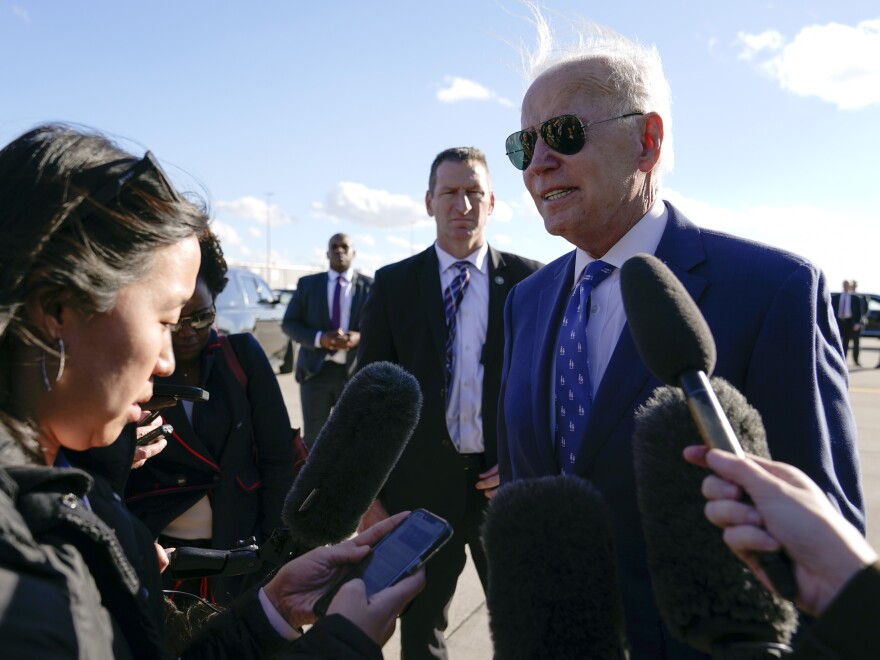Updated January 5, 2023 at 11:09 AM ET
The White House is expanding a pandemic-era program allowing the administration to quickly expel people from Nicaragua, Cuba and Haiti who illegally cross into the country from Mexico.
President Biden will announce the plans at the White House this morning ahead of meetings Biden will have in Mexico City next week with Mexican President Andrés Manuel López Obrador. As part of that trip, Biden has said he plans to make a stop at the southern U.S. border.
The speech is scheduled for 11:15 a.m. EST. Watch it live here:
He will also announce new limited legal pathways to the United States for migrants from those countries who have family or other pre-existing ties to the country.
"Effective immediately, nationals from Venezuela, Nicaragua, Cuba and Haiti who attempt to cross our border unlawfully will be very swiftly returned to Mexico and will be found ineligible for this program," a senior administration official told reporters.
The new plan is modeled after a policy rolled out this fall for Venezuelans with ties to the U.S.
Under the new plan, the United States will accept up to 30,000 Cubans, Nicaraguans, Haitians and Venezuelans each month while expelling those who arrive at the border unlawfully.
The administration said it saw a "dramatic drop" in the number of Venezuelans arriving at the border after implementing the program in October.
"We view this as one of the most significant achievements of the Venezuela process: fewer people risking their lives and their entire life savings at the hands of human smugglers," another senior administration official said.
To be eligible, applicants would need to have a U.S. sponsor and need to pass security vetting.
The administration also plans to boost refugee resettlement from the western hemisphere to up to 20,000 people this year and next year, officials said.
The trip comes with many political perils
The plan is likely to be criticized by immigration advocates who see the enforcement measures far outweighing legal pathways into the country.
House Republicans have also vowed to make Biden's immigration record one of their top issues in the new Congress. However, the House has been deadlocked, unable to conduct any business, because of internal Republican dissent over who to elect as speaker.
Biden, who faces the prospect of working with divided government for the rest of his term, has been urging Congress to pass comprehensive immigration reform. He put forward a proposal on his first day in office, but Democrats did not invest much political capital to try to advance the plan during Biden's first two years in office.
The White House has been looking for a replacement to Title 42
The administration has been relying on a public health measure known as Title 42 to quickly expel most migrants seeking asylum without a hearing. Those measures remain in place, pending court action. But the new measures are designed to eventually replace Title 42, and some of them take effect immediately, administration officials told reporters on a briefing call.
Title 42 was put place by the Trump administration at the start of the COVID-19 pandemic, but immigration advocates argued it had been misused.
A federal district judge had ordered the Biden administration to lift the restrictions on Dec. 19. However, the U.S. Supreme Court agreed in late December to give time for 19 Republican-led states to make a legal case to keep the restrictions in place.
The White House has said it preparing for the eventual end of Title 42 restrictions, but it has not yet unveiled a new plan for dealing with large numbers of people seeking asylum.
In 2021, it launched a pilot program aimed at using asylum officers at the Department of Homeland Security to hear some cases quickly instead of first sending them to overloaded immigration judges.
It also created a program for Venezuelan asylum applicants, limiting it to people applying from outside the United States, rather than at the border.
Biden will travel to Mexico City next week
Republicans have excoriated Biden for failing to visit border communities grappling to provide services to migrants. The president told reporters he plans to travel to the region "to see what's going on" next week.
After stopping in El Paso on Sunday, Biden will continue his trip to Mexico City on Monday and Tuesday for the North American Leaders' Summit to talk about issues like climate and the economy — but also fentanyl smuggling and migration.
He has had an uneasy relationship with Mexico's López Obrador, who failed to congratulate Biden for winning the 2020 election for weeks, and boycotted a high-profile regional summit in Los Angeles last year.
"Biden doesn't need to get along with López Obrador. What he needs is López Obrador not to get him in trouble with the border, with migration," said Carlos Bravo Regidor, a political analyst based in Mexico City.
"And I think López Obrador knows it, and that is why he pushes so hard and he is trying to pick a fight," Bravo Regidor told NPR.
Copyright 2023 NPR. To see more, visit https://www.npr.org. 9(MDIxMDkyNjUxMDE0NDY1Njg1NzRiOTRiYQ000))







